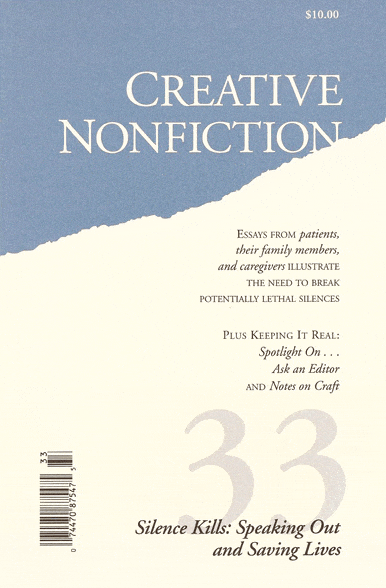Issue 33 / 2007

33 / Silence Kills: Speaking Out and Saving Lives
An unflinching look inside the American health care system
These essays present a compelling, and often frightening, look at the lack of communication and understanding currently plaguing the American health care system.
These stories explore a wide and complicated range of experiences—a doctor is pressured into sending a patient home from the emergency room but later must face his decision when the patient suddenly dies; a physician deals with the doubt brought on by a malpractice lawsuit and must come to terms with the fact that even doctors are fallible and human; a woman fights for her mother’s mental health against a system eager to over-medicate the elderly; and more—but all share one thing: a frustration with a system that hinders communication and often leads to unnecessary suffering.
Already a subscriber?
Read this issue nowTable of Contents
What’s the Story #33
This is Creative Nonfiction‘s third issue devoted to health care. The first, issue no. 11, A View from the Divide, dealt generally with science, biology, and psychology. It is still in print and has been repeatedly acknowledged by critics and teachers for the fine writing it contains.Foreword: Toward a More Caring, and Curing, Health System
When the Jewish Healthcare Foundation commissioned this project with Creative Nonfiction, we had something specific in mind. We wanted to build on a study by the American Association of Critical Care Nurses, also called Silence Kills, that highlights how health care professionals avoid conversations crucial to good patient care.Introduction
The stories in Silence Kills might appear to be about medicine. My sense when I was done reading them was that they were really about life, about the very human urge to extend life and relieve suffering, and about how easily in trying to make things better we can make things worse.The Good Doctor
Twenty minutes before Dr. John Riley stepped back into the bronchoscopy suite of University Hospital and uttered the word “stop,” the day seemed promising.Missing
We’re sorry; we’re currently unable to make this work available online.Mrs. Kelly
“It’s not that bad.” Mr. Kelly smiled. “I’m not even hurting now.” He was a forty-two-year-old house painter who’d been having intermittent chest pain for two days. Three wires ran from under his patient gown to the monitor in the corner, where a fine green line bounced with every beat of his heart.Non Pro Nobis
“Medic! Medic!” The screams came from above me. I ran up the trail and into the woods. Red and white smoke billowed across the ground, obscuring everything.Saving My Breath
On the Sunday night after my overdose, when I was certain no one would be there to answer, I called my internist’s office. I styled my voice to sound casual and perky, evoking a 1950s receptionist.Watching My Mother Hallucinate
“You look so much like your mom,” says the starched, very pregnant nurse at the rehab unit where Mom has been sent to recover from her hip surgery, “only younger.” My pulse skips whenever someone says this.Foreign Bodies
Often, as an ophthalmologist, my father has to deliver bad news. He tells people what’s wrong with their eyes and hands them some words to hold onto: Astigmatism, cataracts, glaucoma, macular degeneration.You Have the Right to Remain Silent
We’re sorry; we’re currently unable to make this work available online.See the Difference
We’re sorry; we’re currently unable to make this work available online.In Praise of Osmosis
Critical care nurse Crystal Diggs can’t help but think of Jello when she looks at her patient’s chart. The kidneys of the patient in room D 210 are rebelling because they are trying to do the equivalent of sieving Jello through a coffee filter.
